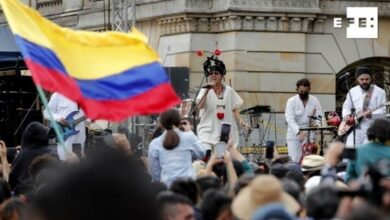Ukraine fears large-scale Russian reprisal for Moscow car bombing

Moscow/Lviv/Geneva, Aug 23 (EFE).- Officials in Kyiv fear that Russia will launch large-scale reprisals after the car-bomb killing in Moscow of the daughter of a well-known ultranationalist thinker, with Wednesday being Ukraine’s Independence Day, which coincides with the six-month anniversary of the Kremlin’s invasion.
“It’s no surprise to anyone that Russia may try to do something special at this time. We know how they act, how they always provoke,” Ukrainian President Volodymyr Zelenskyy said Tuesday upon meeting in Kyiv with his Polish counterpart, Andrzej Duda.
The notorious car-bombing, for which Moscow is directly blaming Kyiv, along with specific acts of sabotage committed in recent weeks in the Ukrainian territories occupied by Russian troops and on the already-annexed (in 2014) Crimean Peninsula, have caused tensions to skyrocket in the areas away from the front lines of the ongoing bloody war.
Zelenskyy – who on Monday warned that Moscow could do something “especially cruel” to take revenge for the car-bombing, an attack which Kyiv denies – confirmed that he had received information from foreign intelligence services about Russia’s plans.
Concern about potential attacks have motivated the US Department of State once again to urge US citizens to immediately leave Ukrainian territory.
The potential threat of heavy Russian reprisals has raised fears of a new attack on Kyiv, with Russia having withdrawn its troops from near the capital in late March after being stymied by Ukrainian forces in its attempts to seize the city and topple the government.
Thus, Ukrainian authorities have cancelled all Independence Day celebrations, prohibited public events for a week, ordered government officials to telecommute to their jobs and cut back the working hours in metropolitan areas.
Without mentioning Ukraine, Russian Foreign Minister Sergey Lavrov warned on Tuesday that no “mercy” will be shown to those who organized the assassination of Darya Dugina, the daughter of Russian intellectual Alexandr Dugin, whose writings have provided much of the so-called justification that President Vladimir Putin apparently needed for launching his country’s invasion of Ukraine.
“I consider it to have been a barbarous crime for which there can be no excuse,” Lavrov said at a press conference after Putin called the killing “vile” in a message of condolence he sent to Dugina’s family.
Lavrov did not say whether the hit – which in all likelihood may have been targeting Dugin himself, since it was his car that his daughter was driving – was an “act of intimidation or a settling of scores,” although he noted that Russia’s FSB intelligence agency, which on Monday directly accused Ukraine of staging the strike, is investigating the crime.
Thousands of Moscow residents on Tuesday morning gathered for Dugina’s wake after Putin on Monday posthumously awarded her the Order of Valor.
Meanwhile, the war in Ukraine is continuing and humanitarian needs in the region continue to increase, reducing the abilities of organizations and donors to attend to other crises around the world, the International Federation of the Red Cross warned on Tuesday.
“For now, if you visit Ukraine, things seem better than three months ago. But people’s savings have already been spent and … there are still a large number of people who will not be able to return to their normal life,” said the head of the Ukrainian Red Cross, Maksym Dotsenko, in a videoconference with reporters in Geneva.
Dotsenko said that the situation “is going to get worse” and that half of Ukraine’s total population (of about 45 million) will require humanitarian aid because the prices of basic goods have risen sharply and winter is approaching, when the lack of shelter will become most evident.
He said that in summer it’s easier for people to remain comfortable outdoors and there are many options for free shelter for those who have been displaced by the war, both in Ukraine and in other countries, but “this will become more and more difficult.”
The IFRC says that it is fundamental to continue with the program to provide money or food vouchers to the Ukrainian people, a portion of whom continue to live in public places like schools or in underground metro stations.
People don’t have money to buy the most basic items and prices have risen “significantly,” he said.
The organization so far has distributed more than 60 million euros ($59.8 million) to 626,000 people in an attempt to provide them with some measure of human dignity and allow them to prioritize what their families really need. This system will remain in operation as the winter approaches.
In addition, the humanitarian network has distributed 25,000 tons of aid in the form of food and basic products and has mobilized 100,000 volunteers who are attending to displaced persons within Ukraine and to Ukrainian refugees in neighboring countries.
EFE





